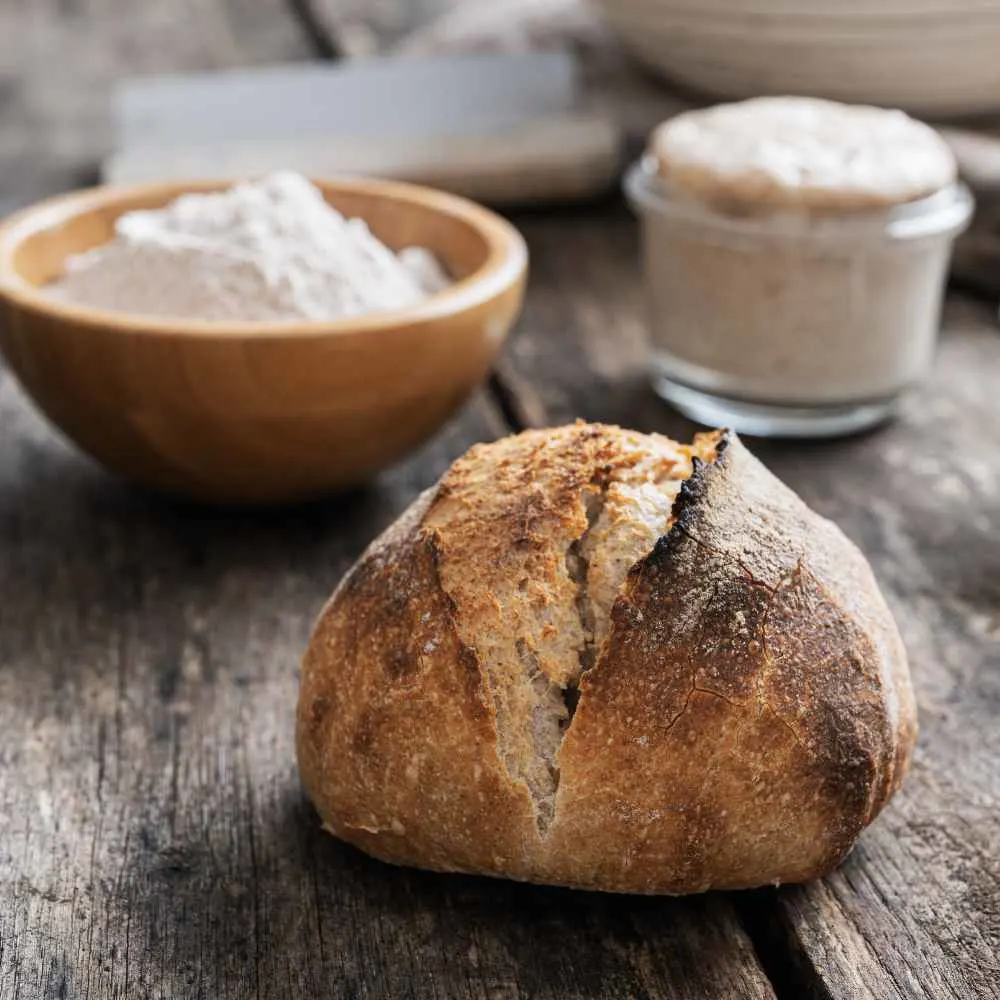Sourdough bread is tangy, delicious fermented bread with a long history in food cultures worldwide. Sourdough has supported human health for thousands of years. These ancient breads regained popularity in recent years due to their health benefits and amazing flavor.
Why is sourdough bread good for you? Sourdough breads are fermented breads made with wild yeast. The fermentation process Improves digestibility and nutrients absorption more than regular bread can. And sourdough bread offers you even more pretty amazing health benefits.
This bread is truly the ‘staff of life’. The process of making sourdough is life supporting, can be done with many variations and different flours. Sourdough bread has immeasurable value in todays world of processed foods.

Why is Sourdough Bread Good For You?
What are the Health Benefits of Sourdough Bread? Sourdough bread is…
- An Excellent source of antioxidants: Sourdough bread is a rich source of antioxidants, which are compounds that protect your cells from damage that can lead to serious diseases such as cancer, heart disease, and Alzheimer’s disease. The lactic acid bacteria in sourdough bread are responsible for the increased levels of antioxidants compared to other types of bread. Some studies have shown that antioxidants like the peptides found in sourdough can lower the risk for certain types of cancer, signs of aging, or chronic diseases like rheumatoid arthritis.
- A Rich source of vitamins and minerals: Sourdough bread is a good source of essential vitamins and minerals, including B vitamins, iron, and zinc. B vitamins are important for energy production, brain function, and the metabolism of carbohydrates, fats, and proteins. Iron is essential for the production of red blood cells and the transportation of oxygen throughout the body, while zinc plays a role in immune function, wound healing, and taste perception.
- Sourdough bread may also have a role in disease prevention. Some studies have shown that the lactic acid bacteria in sourdough bread may have anti-inflammatory effects, which lower the risk of chronic diseases such as type 2 diabetes and heart disease. Sourdough bread also helps to improve gut health. The fiber in the bread acts as a prebiotic and helps to feed the “good” bacteria in the intestines. A healthy gut microbiome is important for maintaining a stable, healthy digestive system.
- Sourdough Lowers blood sugar levels: One of the benefits of sourdough bread is that it helps keep blood sugar levels more stable than white bread. The bacteria in the sourdough starter alter the structure of the bread molecules, making the body absorb them more slowly and lowering the bread’s glycemic index. This means that insulin levels will not spike as high after eating sourdough bread as they would after eating white bread. This can be especially beneficial for people with diabetes or who are at risk of developing diabetes.
Is Sourdough Bread Good For Your Gut Health?
Sourdough bread is excellent for your gut health. Sourdough breads are easier to digest than unfermented bread due to the by-products of the fermentation process that occur during sourdough production.
NOTE: People suffering from Celiac disease cannot safely eat any bread containing gluten. This includes sourdough breads. However, mildly gluten sensitive people have often eaten properly fermented sourdough breads with little or no trouble.
Why is Sourdough Bread Good For You and Your Gut?
The starter culture used to make sourdough bread produces a variety of bacteria including lactic acid bacteria.
- lactic acid improves the digestibility of sourdough bread. This can be especially beneficial for people who have difficulty digesting gluten, a protein found in wheat, as the lactic acid partially breaks down the gluten.
- The acidity of the lactic acid inhibits the growth of harmful bacteria. For this reason Lactic acid produced during the fermentation process helps to preserve the bread, giving sourdough a longer shelf life than other types of breads.
- Lactic acid bacteria produce short chain fatty acids during the fermentation process. These short chain fatty acids also improve gut health.
ProBiotics and Prebiotics Also Contribute To good Gut Health:
Fermented Sourdough starters contain both probiotics and prebiotics. Let’s take a look at how they impact your health.
Probiotics are beneficial bacteria that, when consumed, help to restore the balance of good bacteria in the gut, which can have a number of health benefits.
Research suggests that consuming probiotics through fermented foods like sourdough bread is particularly beneficial. The fermentation process increases the number of live probiotics present in the food.
In addition to helping to maintain a healthy balance of gut bacteria, probiotics also help boost the immune system, reduce the severity of certain digestive disorders, and even improve mental health.
Prebiotics are non-digestible plant fibers that serve as food for the beneficial bacteria in the gut. Like probiotics, prebiotics can help to promote the growth of good bacteria and maintain the balance of the gut microbiome, which can have a number of health benefits.
Research suggests that consuming prebiotics through fermented foods like sourdough bread is particularly beneficial. The fermentation process breaks down the prebiotics and make them more easily available for the bacteria in the gut to use.
Like with probiotics, Prebiotics improve digestive health, boost the immune system, improve metabolic health and reduce inflammation. This lowers the risk of certain chronic diseases such as heart disease and type 2 diabetes.
A healthy microbiome is important for maintaining a stable, healthy digestive system. Prebiotics and probiotics both are needed for good gut health.
The probiotic content of sourdough bread will vary depending on the specific starter culture used and the fermentation process. Some sourdough breads may have higher levels of probiotics compared to others.
In addition, The live microorganisms in sourdough bread may not survive the baking process, so it is uncertain how much of an impact they may ultimately have on the body when consumed.
Is Sourdough Bread Healthier Than Yeast Bread?
Yes Sourdough bread is healthier than commercial yeast bread due to the complex process of fermentation of the flour, wild yeasts and water. This process provides health benefits commercial yeasts cannot offer. The sourdough fermentation creates the magical sourdough flavor and all the health benefits.
Why is Sourdough Bread Good For You When Compared to Yeast Bread? Sourdough is…
- Easier to digest: The fermentation process breaks down the complex carbohydrates in the flour, making it easier to digest. The wild yeast and bacteria in the starter consume some of the sugars and complex carbohydrates in the flour. This helps reduce the overall carbohydrate content of the bread.
- Lower in sugar: Sourdough bread is typically lower in sugar than a comparable bread recipe made with commercial yeast. The sourdough fermentation process consumes some of the sugars in the flour. This makes it a good option for people who are looking to reduce their sugar intake.
- High in nutrients: Sourdough bread is made using a traditional method of fermentation that allows the nutrients in the flour to be more easily absorbed by the body.
- Sourdough is Low in phytates: Phytates are compounds found in whole grains that can inhibit the absorption of certain minerals, such as zinc and iron. The fermentation process that occurs during the production of sourdough bread helps to break down the phytates, making it easier for the body to absorb the minerals in the bread.
- Sourdough bread is typically higher in protein and absorbed nutrients than a comparable yeast bread.
Is it Ok To Eat Sourdough Bread Everyday?
Sourdough bread is ok to eat every day as part of a healthy, balanced diet. It is easily digestible and has some health benefits. However, even healthy Carbs need to be limited to a proper portion of your daily nutritional intake.
Is White Sourdough Bread Healthy? White Sourdough bread is healthier than white yeast bread. The fermentation process of sourdough partially breaks down the proteins and fibers in the flour. This makes it easier for the body to digest and absorb the available nutrients in sourdough white bread.
White sourdough bread is made from white flour, which has been stripped of the outer bran and inner germ layers during the milling process. As a result, white flour is lower in fiber and nutrients compared to whole grain flour.
Whole grain sourdough bread is a healthier option compared to white sourdough bread. Whole grain flours are higher in fiber and nutrients.
Is Sourdough Bread Good For Weight Loss?
Sourdough bread may be helpful for weight loss or weight management. It has a Lower glycemic index,Lower calorie content and increases satiety more than commercial yeast breads. These attributes of sourdough bread all help those looking for weight management solutions. However, more research is needed to fully understand the relationship between sourdough bread and weight.
Lets look a bit deeper into why sourdough bread may be helpful for weight loss:
- Lower glycemic index: Studies have found that sourdough bread has a lower glycemic index (GI) than bread made with commercial yeast. The GI is a measure of how quickly a food raises blood sugar levels. Foods with a high GI are absorbed quickly by the body and can cause a rapid rise in blood sugar, while foods with a low GI are absorbed more slowly and have a slower, more gradual effect on blood sugar. A lower GI may be beneficial for weight loss because it can help to prevent blood sugar spikes and crashes, which can lead to overeating.
- Lower calorie content: Sourdough bread is lower in calories than bread made with commercial yeast, as the fermentation process consumes some of the sugars in the flour. This makes sourdough bread a good choice for people who are trying to reduce their calorie intake as part of a weight loss plan.
- Increased satiety: Studies show that sourdough bread is more satiating than bread made with commercial yeast. This means that sourdough baked goods help people feel fuller and more satisfied after eating. This can be helpful for weight loss. Eating sourdough bread can help to prevent overeating and snacking between meals.
While sourdough bread has some benefits for weight loss, and weight management, it is not a magic solution. A healthy, balanced diet and regular physical activity are still important factors in achieving and maintaining a healthy weight.
Sourdough And Disease Risk Reduction:
Sourdough has many healthy components throughout the development and fermentation process. Eating properly made sourdough bread has health benefits that are being specifically highlighted in studies as a positive dietary component for combatting and managing some diseases.
Is Sourdough Bread Good For Acid Reflux?
People with acid reflux often find that certain foods trigger their symptoms, including certain types of bread. Why is sourdough bread good for you? A big reason is Sourdough bread is easier to digest than other types of bread. This makes it less likely to trigger symptoms of acid reflux.
Sourdough Bread and Cancer: It’s pretty exciting to see that some research has suggested that the lactic acid present in sourdough bread may actually help reduce the risk of certain types of cancer.
As we have noted above in this article, lactic acid bacteria are responsible for increased antioxidants in sourdough bread. Antioxidants protect your cells from damage that cause serious diseases such as cancer, heart disease, Alzheimer’s disease and more.
One study has suggested that people who eat sourdough bread may have a lower risk of colorectal cancer. This is a population-based case-control study conducted in Italy. The study included 679 individuals with colorectal cancer and 1,286 healthy controls.
The researchers found that individuals who consumed the most fermented foods, including sourdough bread, had a lower risk of colorectal cancer compared to those who consumed the least.
It is important to note that this study was observational, meaning that it cannot prove cause and effect. More research is needed to fully understand the relationship between sourdough bread and colorectal cancer risk.
So, it is not clear to what extent sourdough bread specifically may contribute to a reduced risk of colorectal cancer. But this study is hopeful.
Is Sourdough Bread Good For Cholesterol? Research suggests that sourdough breads reduce risk of high cholesterol. One study found that individuals who ate sourdough bread had lower total cholesterol and LDL cholesterol levels compared to those who ate non-sourdough bread.
Another study concluded Individuals who eat sourdough bread have a lower risk of developing high cholesterol compared to those who eat non-sourdough bread.
However, The relationship between diet and cholesterol levels is complex and involves many factors, such as genetics, lifestyle, and other dietary factors. Therefore, it is not crystal clear to what extent sourdough bread specifically contributes to lower cholesterol levels.
Is Sourdough Bread Healthy For Diabetics? Sourdough bread is a good choice for diabetics, within the frame work of their personal carb allowances. Sourdough is typically lower in sugar(carbs) than bread made with commercial yeast since the fermentation process consumes some of the sugars in the flour.
Sourdough bread has a lower glycemic index (GI) compared to other types of bread when made with whole grain flours. The glycemic index is a measure of how quickly a food raises blood sugar levels. Sourdough whole grain breads take longer to digest. This lowers the GI since absorbing the carbs and sugars is slowed down. The slower digestion of carbs keeps blood sugar levels more stable.
Other factors, such as the overall nutrient content of the bread, using whole grains vs. white bread four, portion size, and the presence of other foods in the meal, can also affect blood sugar levels.
The glycemic index can vary depending on the specific type of sourdough bread and the ingredients used. If you want a Sourdough Bread recipe that is slow to digest and low in sugar try our Whole Wheat Sourdough Bread.
Overall, sourdough bread a good option for people who are looking to reduce their sugar intake.

So Is Sourdough Healthier Than Other Breads? Sourdough bread is healthier than several other types of bread. There are several health benefits strongly associated with sourdough bread, including better digestibility, increased nutrient absorption, lower sugar content and increased satiety.
So what is the healthiest bread to eat? The healthiest bread to eat is easily digested with a dense nutritional profile, lots of fiber and low sugar content and NO added chemicals. Sourdough can be that bread when made organically with the full fermentation cycle and excellent, fresh whole grains flours.
However, not all sourdough breads are made with whole grains and some sourdough breads contain a lot of sweeteners and other add ins that compromise the health of the bread. Some sourdough bakers and bakeries cut the fermentation cycle short to save time which also reduces the health benefits of sourdough.
Know your bread source or make your own using the proper techniques and ingredients to ensure the highest quality nutrition your sourdough bread can deliver. Happy Baking!
Watch Us Make Our Favorite Artisan Sourdough Bread:
This bread is made with white flour. But the process is exactly the same for our whole wheat artisan loaf. Make your own bread and use this simple method and the best ingredients to make a healthy delicious bread your family will enjoy.
Sourdough Recipes You May Enjoy:
Here are a few of our most delicious and well loved sourdough recipes.
- Beginner Sourdough Artisan Bread Recipe:
- Soft Sourdough Sandwich Bread Recipe:
- Milk and Honey Sourdough Sandwich Bread:
- Sourdough Cranberry Walnut Bread
- Sourdough Bagels
- Sourdough Pretzels
- Sourdough Cinnamon Raisin bread
- Sourdough cinnamon rolls
- Crusty Sourdough Jalapeño Cheese Bread
- Easy Sourdough Pizza Crust
See All of Our Sourdough Recipes and Informational Articles Here
Follow Us:
We enjoy meeting you on our social networks. Follow us on Facebook, Pinterest, Instagram . Tag us with your pictures of our recipes and comment on how it went for you. We would love to see what you do with them.
We often like, comment and share your posts of our recipes on our daily Instagram stories.
Ask questions and rate the recipe in the comments section below. Please share what you did with this recipe. We are always looking for more and better ways to make homemade food. Other cooks love your ideas!
Recent Posts:

Further Reading On Why is Sourdough bread Good For You:
- Sourdough Microbiome Comparisons and Benefits
- Role of Lactic Acid and Yeasts in Sourdough Fermentation.
Studies that suggest that sourdough bread may be beneficial for cholesterol levels:
- Aune, D., Giovannucci, E., Boffetta, P., Fadnes, L. T., Keum, N., Norat, T., … & Vatten, L. J. (2017). Whole grain and refined grain consumption and the risk of type 2 diabetes: a systematic review and dose-response meta-analysis of cohort studies. European Journal of Epidemiology, 32(6), 461-475.
- Volynets, V., & Kondjoyan, A. (2015). The effect of sourdough on cholesterol levels in humans. Czech Journal of Food Sciences, 33(6), 467-474.
- Fabbri, E., Martini, D., Rota, M., Bosetti, C., Negri, E., Talamini, R., & La Vecchia, C. (2009). Fermented food intake and the risk of colorectal cancer. International Journal of Cancer, 125(3), 633-637.

Christine
Friday 12th of April 2024
I have made several of your soft sandwich sour dough loafs and the come out perfect every time. Do you have a recipe for sourdough artisan bread. Not sure if I’m saying that correctly.
Diane
Friday 12th of April 2024
Hi Christine, Yes we do! Give this Artisan Sourdough bread a try. There are also several other sourdough bread recipes in our sourdough bread section and each one other has something yummy to offer you. Be sure to take a close look at the roasted garlic rosemary bread, our cheesy Jalapeño bread, and so many more great sourdough recipes. We are delighted you're enjoying our recipes. Thanks for letting us know. Happy Baking!